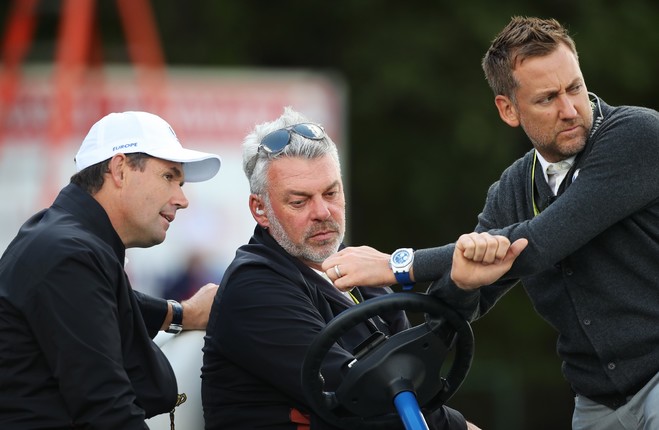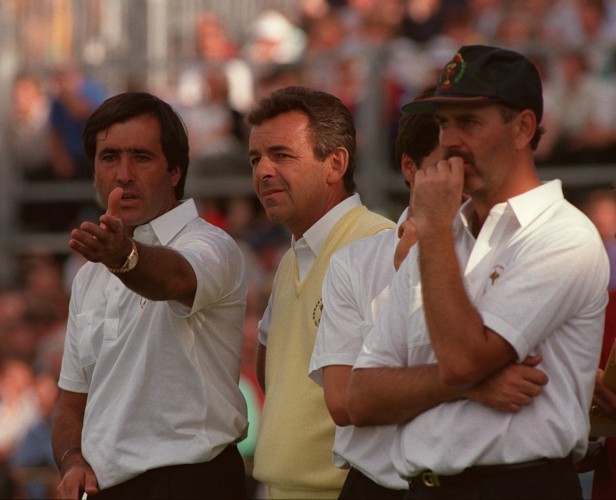THE RYDER CUP will, as usual, provide a thrilling, gripping weekend of golf, and then a massive pile of baloney in its aftermath.
Most of it will be written about the winning captain, who, despite not hitting a shot, will be portrayed as a conquering, Napoleonic figure, rather than a middle-aged man in slacks driving a golf buggy around manicured parkland.
Take this from the hours after Europe’s triumph in 2014, when the beatification of Paul McGinley was in full swing.
“At the after-match celebrations the inspired European captain told his players to go easy on the alcohol,” wrote BBC golf correspondent Iain Carter.
‘Don’t go overboard,’ he told them. ‘Make sure you can remember this for the rest of your lives.’ It was typical of the Irishman.”
Yes, in the afterglow of a Ryder Cup victory, even cautionary advice not to get totally banjaxed becomes etched in the legend of the winning captaincy.
McGinley was fêted for everything from drafting in Sir Alex Ferguson for a team talk, to ensuring the tropical fish in the team room were blue and yellow in colour.
With neither Fergie nor the fish having holed a putt all weekend, it’s impossible to say if these details made any difference; but in the context of a thumping 16 1/2 to 11 1/2 trouncing of the Yanks, every idea of McGinley’s was deemed inspired.
This is not to say that McGinley wasn’t a good captain, or even, as was breathlessly claimed after Gleneagles, the greatest European captain ever.
But it is part of a well-established tendency to mythologise the role of the Ryder Cup captain, something that the author and business journalist Richard Gillis deconstructs in his book The Captain Myth – The Ryder Cup and Sport’s Great Leadership Delusion.
Gillis identifies the phenomenon of the Good Captain and Bad Captain, characters who are created after Ryder Cups, depending on which way the result falls. This act of myth-making sees all the winner’s decisions become masterstrokes, and all the loser’s disasters.
It’s a classic case of ‘leadership attribution bias’, according to Gillis, a term from the business world for when CEOs are treated like gods for the success of their companies regardless of the actual worth of their contributions.
Tony Jacklin was the first European to really inhabit the Captain Myth. Fair enough, perhaps, given that it was under his watch that the contest turned from something other than a biennial American victory parade.
Jacklin is credited with a buttressing European self-esteem in the face of their traditionally richer, more glamorous opponents, using what Gillis describes as a ‘cashmere and Concorde’ strategy. The Europeans would travel in a manner befitting international superstars, and they’d be dressed the part too.
“He (Jacklin) brought the belief that we could beat the Americans,” said Jose Maria Olazabal of the 1987 competition in Muirfield Village. “We flew on Concorde, we got high quality clothing, he made us believe we were special.” Europe won 15-13, the first time America had lost on home soil in Ryder Cup history.
It’s perhaps worth mentioning that Jacklin also had the good fortune to captain the first generation of European golfing superstars. Nick Faldo, Seve Ballesteros, Sandy Lyle, Bernhard Langer, Ian Woosnam and Olazabal were either already major winners or would be in the future, and would backbone Jacklin’s teams.
Yet Jacklin, zooming in his buggy around the Belfry or Muirfield Village with shades and walkie-talkie, is the epitome of the Good Captain.
Olazabal himself is a Good Captain, based on the Miracle at Medinah in 2012, when his team turned around a 6 point American lead towards the end of Saturday’s fourballs to win by a point.
The miracle bit of the story is obvious: Ian Poulter shot four consecutive birdies on Saturday evening to win a precious point and turn the momentum Europe’s way; Justin Rose’s monster putt on the 17th in his singles match against Phil Mickelson helped steal what would be a decisive point.
But the sudden turnaround meant that Olazabal had to be rebranded from Bad to Good Captain.
During the week Olazábal had been painted as being an amiable but somewhat disengaged presence. In the face of America’s onslaught, Olazábal’s grip of events seemed to slip,” writes Gillis.
Key players Poulter, Luke Donald and Sergio Garcia were mysteriously rested on Friday afternoon; Swede Peter Hanson was dropped from the Saturday fourballs twenty minutes before tee off; Rory McIlroy almost missed his tee time on Sunday morning: the Bad Captain narrative of shambolic organisation and bad decision-making was being written – and then everything changed.
Olazábal’s captaincy was subsequently ascribed magical, otherworldy qualities, with his frequent invoking of the spirit of his late friend, Ballesteros, credited with pulling the miracle from the ether.
There’s plenty of this stuff; Colin Montgomerie has dined out on his winning captaincy at Celtic Manor in 2010, despite admitting himself that Graeme McDowell’s famous, clinching putt against Hunter Mahan would normally only go in “1 per cent” of the time.
Just this week Hal Sutton’s 2004 Bad Captain narrative got an airing from Phil Mickelson, Sutton’s decision to pair him with Tiger Woods providing ample cover for Lefty’s failure to muster more than one point that year.
So come Sunday evening, when the great struggle is tilting one way or the other, and one man in a golf buggy with a walkie-talkie in his hand is about to triumph over another, be ready for what’s coming next.
Sure, there are good captains and bad captains, but the Good Captain and the Bad Captain are the stuff of Ryder Cup myth.


